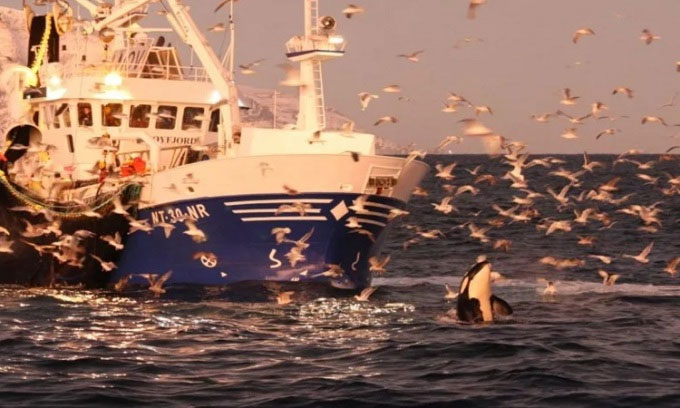Scientists have discovered that orcas have begun to eat fish from fishermen’s nets, viewing it as an easily accessible food source.
The research team, led by Morgane Amelot from Deakin University in Australia, monitored the foraging behavior of two groups of orcas around the Crozet Islands in the southern Indian Ocean from 2003 to 2018.

An orca swimming in front of a fishing boat. (Photo: Alessandro De Maddalena).
Orcas are highly intelligent animals capable of adjusting their behavior according to their environment. They primarily eat fish and squid but also target larger animals such as seals, seabirds, and even whales. Recently, a group of orcas in South Africa has been hunting great white sharks for their livers.
Although fishermen have been accustomed to orcas exploiting hooks for an easy meal since the mid-1990s, the latest research published on February 2 in the Royal Society Biology Letters reveals how rapidly this new behavior has spread within the population. During the study period, the number of orcas stealing fish from hooks increased significantly in both groups, from 34 to 94 and from 19 to 43 respectively.
According to Amelot, the research demonstrates how orcas learn new behaviors in response to human activity. By expanding fishing grounds worldwide, humans inadvertently provide orcas with a new food source.
“There are many mechanisms to explore to better understand the process by which orcas learn behaviors and spread them among individuals and pods,” Amelot said. “These mechanisms exist not only in orca populations but in other species as well. This research is a step forward in understanding how behaviors become prevalent in marine mammal populations.”
The development of new behaviors may alter the predatory role of orcas in the ecosystem. It could alleviate pressure on prey species in the short term while boosting orca populations in the long term due to the positive impact of available fish on nursing females.
Orcas inhabit all oceans around the world; however, they are most commonly found in colder waters such as Antarctica, Norway, and Alaska. Amelot and colleagues concluded that the research reflects how quickly orcas respond to new food sources and the impact of human activity on the diet of this apex predator.


















































